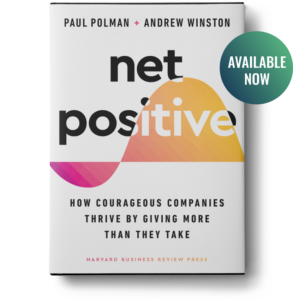(It’s hard to focus on much these days as the world seems in dire shape and the US in particular is unable to tackle any problems – one political party is rapidly moving backwards on women’s rights, guns, climate, inequality, racial equity, voting & democracy, and more. The only solution here is elections. But the work of sustainability continues, perhaps more important than ever. I ran this little rant in MIT Sloan Management Review last month. When I posted it to LinkedIn, it went about as viral as my stuff goes. 144,000 impressions. 300+ comments. You’ll see that my argument is about the use of “ESG” in place of broader ideas like sustainability in companies. I’m not thrilled about it, but not for wonky semantics reasons — in this case it’s the source of the language, the finance world, that poses problems. We’re finding ourselves back in the “what’s the shareholder value of it?” territory — a cul-de-sac of mostly useless discussion.)
Over the 20 years I’ve worked at the intersection of business and society, I’ve seen many terms applied to this part of the business agenda: compliance, eco-efficiency, corporate social responsibility, socially responsible investing, green, clean, sustainability, regenerative, net zero, net positive, and many more.
Some variation in how we talk about all of this is helpful, but we also need some common language that’s both relatively easy to comprehend and interesting. In tech, for example, “blockchain” sounds much cooler than “a shared, immutable ledger for recording transactions.” In the realm of the overlap of business and society, sustainability has had the most staying power, often for lack of something more exciting.
But in recent years, ESG — which stands for environmental, social, and governance — has become the dominant term. Within the narrow world of the sustainability expert community, the battle royale is raging about sustainability versus ESG and the implications of shifting semantics. I don’t want to litigate what these words mean, but I do want to look at why ESG has taken over so fast and discuss some risks I see from the term’s adoption.
The Investment Community Embraces ESG
I think the core reason for the rise in the use of ESG is the investment community’s arrival on the sustainability scene, at long last. Investment in so-called ESG funds has skyrocketed, with well over $1 trillion flooding into ESG funds in the past two years. ESG has been the language the money people use to distinguish investment funds that, in theory, screen companies for some level of sustainability performance or advantage.
That said, debate over whether funds that claim to be ESG focused are actually picking companies that do better by the world has led to a stupendous and justified backlash. Some people are even arguing that the traditionally excluded defense sector should now be included because weapons are being used to defend democracy in Ukraine. That assertion is more than a little muddy, so clearly ESG has to evolve and get refined. These are important debates, and regulators are taking notice: The U.S. Securities and Exchange Commission issued a warning about these funds, noting the “rapid growth in demand, increasing number of ESG products and services, and lack of standardized and precise ESG definitions.”
Why are investors at the table now? I see three big reasons.
First, the nature of the systemic risk that climate change poses is becoming clearer. Record-breaking droughts, floods, fires, and storms destroying communities and disrupting supply chains are hard to ignore. They are creating real costs to business, and regulators are moving quickly to mandate that companies understand and report on the material impacts of climate-related risks on their operations and strategies.
Second, investors are feeling pressure from their stakeholders. In 2019, I spoke at an event for wealthy customers of a multinational bank. The bank’s global head of private wealth talked about a customer survey the bank had just conducted. They said that the No. 1 issue its private wealth clients cared about was no longer something like estate planning or portfolio mix; rather, it was impact investing and ESG. I’ve heard about this pressure from multiple sources, and I believe it’s coming largely from the younger members of wealthy families essentially saying to their grandparents, “OK, we have a lot of money, but what’s the point?”
Finally, the biggest reason is economic opportunity. The shift to the clean economy is accelerating, and multi-trillion-dollar markets are in play — creating radical shifts in energy, transportation, food and agriculture, materials, consumer products, finance, and more. As Larry Fink, CEO of BlackRock, the world’s largest asset manager, wrote last year, “There is no company whose business model won’t be profoundly affected by the transition to a net zero economy. … Companies that are not quickly preparing themselves will see their businesses and valuations suffer.”
All are affected, but some more than others. Investing in companies that provide or leverage clean technologies makes sense, given that they increasingly outcompete “dirty tech” companies. Preferring companies that take advantage of rapidly expanding markets and respond to customer demands is no do-gooder philanthropy — it’s good business. No investor would question increasing exposure to, say, AI technologies. Big trends draw big money, and the move to a carbon-free economy is as big a trend as they come.
The Risk of Viewing Sustainability Through a Market Lens
With all those forces coming to bear, investors are here to stay. Even with the incredible chaos around defining ESG, it’s better to have finance people at the table than not. We can’t truly get momentum in corporate sustainability with investors on the sidelines; CEOs don’t feel much pressure unless investors want something. But I have a couple of concerns about the dominance of ESG as the rallying cry.
On the level of language, which can guide behavior and outcomes, the term ESG is fairly meaningless. It’s an acronym for categories of things companies should work on. That’s likely a part of why investors like it — they can look like they’re talking about real progress on environmental and social issues without saying much at all. Efforts can easily drop into incremental approaches that may be worse than nothing. As Paul Polman, my coauthor on the book Net Positive, likes to say, “So if I killed 10 people before but only five now, am I a better murderer?”
When a company announces, in essence, “We’re doing ESG,” what does that tell you? It’s like saying “We do HR.” OK, so you have a human resources department and a senior vice president running it, but what are you doing with your people? Investing in them? Helping them find their purpose? Or maybe laying off all permanent staff — over Zoom! — to replace them with temps?
We clearly need to imbue ESG with meaning. We need sustainable or regenerative or net-positive ESG. Of course, these terms also need details behind them, but at least they tell you something about the direction in which you’re headed.
But I have a larger philosophical concern with investor-led language. Seeing all things through the lens of markets and the quest for shareholder maximization is largely how we got into this mess in the first place. We’ve put profits above literally all else, and it’s leading to ecological collapse and vast inequality. Framing a company’s commitments around battling climate disaster in investor terms turns it into an exercise of “Does this create shareholder value?” — which is not beside the point but skews the world dramatically. Sure, shareholders should do well, but only after a company has served a purpose for stakeholders and helped protect the world and resources we all rely on to survive and thrive.
Investors aren’t well positioned for this approach. Just as fossil fuel companies should not lead the planning of our energy future, it seems unwise to let finance lead the journey to a humane, more just, less greed-filled form of capitalism.
This isn’t all just semantics. If we talk mostly in broad terms about what we’re doing and not in concrete, science-based ways about how fast we need to cut carbon or improve human rights, where are we, exactly? That said, even though I’m a writer, and words and rhetoric matter to me, I’ve always cared far more about outcomes. If your company’s carbon emissions are declining quickly and it’s paying living wages, working in its sector to find larger solutions, lobbying for the kinds of policies that help create systemic change, working to defend democracy and science, and so on … then you can call your efforts any number of things, so long as it works for you. Walmart, for example, has embraced becoming a “regenerative” company — and if that motivates the organization, fantastic.
Either way, the moral and business imperative for leaders today is to focus on what really matters: action at the speed and scale we need to build a net-positive world.
*Photo: The “Little” Tower of Babel, Pieter Bruegel de Oude, 1563,Museum Boymans-van Beuningen, Rotterdom
If you enjoyed this article, please pass it on.
Subscribe to get all of Andrew’s articles in your in-box.



